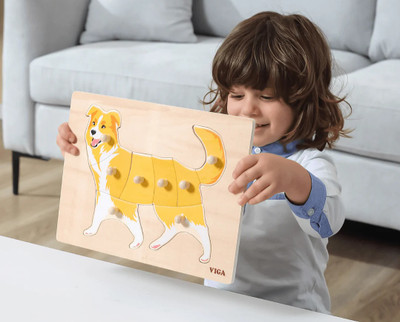Kids Wooden Puzzles & their Benefits
Posted by Aileen Cuaresma on Dec 27, 2023
Aside from being an excellent source of recreation, puzzles are essential educational tools that can help enhance the development of children. Young children and toddlers can benefit from the learning opportunities they present.
Puzzles can play a significant role in determining your child's understanding and knowledge. They come in different types that help tap on various areas of learning and intelligence. They also involves challenges that provide a sense of accomplishment.
Here are some valuable benefits your child can benefit from playing with wooden puzzles:
Physical Skills
- Hand-eye coordination. Kids learn the connection between their eyes and hands when they try to turn, remove or fit puzzle pieces to find their proper places. A puzzle is a fun way to develop the ability of their eyes' to coordinate what they see with what their brains picture, and what their hands do.
- Gross motor skills. Stacking puzzles like the Djeco Stacking Puzzle and those with larger pieces can improve your toddler's big movements where he can then work on his fine motor skills.
- Fine motor skills. Getting a puzzle piece on its appropriate place requires precise and small movements of your kid's fingers which can lead to excellent typing and writing skills .
Emotional Skills
- Setting Goals. Your child's first goal in any of his puzzle toys is to solve it. Your kid will then come up with different strategies on how to work on solving puzzles like the Viga Farm Block Puzzle which can include placing similar colours or pictures in a pile as a reference in the future.
- Patience. Kids learn persistence and patience when playing with puzzles like the Viga Dinosaur 24pc Puzzle. Once they completed the puzzle, they will a sense of accomplishment that will help boost their self-esteem and independence.
Cognitive Skills
- Understanding the world around them. Your toddler will have a better understanding of the world surrounding them by letting them manipulate it literally with the help of puzzles.
- Shape recognition. Hape Geometry Puzzle and similar simple first shape puzzles can teach your baby to learn about the different shapes such as circle, triangle, square, and rectangle.
- Problem-solving. Your child will use his critical thinking skills to complete puzzles. Whether it the pieces fits or not, he will not be able to cheat on it.
- Abstract thinking. Playing with puzzles will encourage your child to use his deductive reasoning and adaptable thinking skills when trying to find various ways to fit the pieces together.
Other Skills
- Socialization. Unique puzzles such as the Hape Dynamo Dominoes can help expand the socialization skills of your child by engaging in conversation with their peers as they cooperatively work together to complete it.
- Creativity and imagination. Your child's creativity and imagination are encouraged when playing with mosaic puzzles like the Hape Magnetic Mosaic. The shapes and colours of the pieces of the mosaic can encourage continued interest and stimulate his brain cells.
- Language skills. Children will usually describe what they are looking for when asking for a specific puzzle piece. Their identification and speech skills are also encouraged depending on the puzzle's subject matter like numbers, animals, shapes, and more.
Different Types of Puzzles
Puzzles are classic toys that catch your kid's attention and lets him explore and discover his different skills. Here are the most popular types of puzzles to help narrow down your choices:
- Non-Connecting Puzzles
This type is the simplest and is great for toddlers. Puzzle pieces do not have a connection with each other but rather belong to several categories. A good example of this type is fit-the-figures-correctly like the Hape Chunky Clock Puzzle and geometric inserts.
- Connecting Puzzles
These puzzles are more challenging than the latter and are usually board puzzles without reference on where the pieces might fit or go. The Hape Go-Fish-Go Magnetic Marble Maze, connect the dots, and column matching are some examples of connecting puzzles.
- Jigsaw Puzzles
This classic puzzle type is a step ahead of the connecting puzzle. An example of this is the George Luck Ark Puzzle where your child needs to fit every puzzle pieces with each other in order to complete it. It's great for improving hand-eye coordination while developing your kid's perceptual skills. This type also includes crosswords, missing elements, and riddles.


